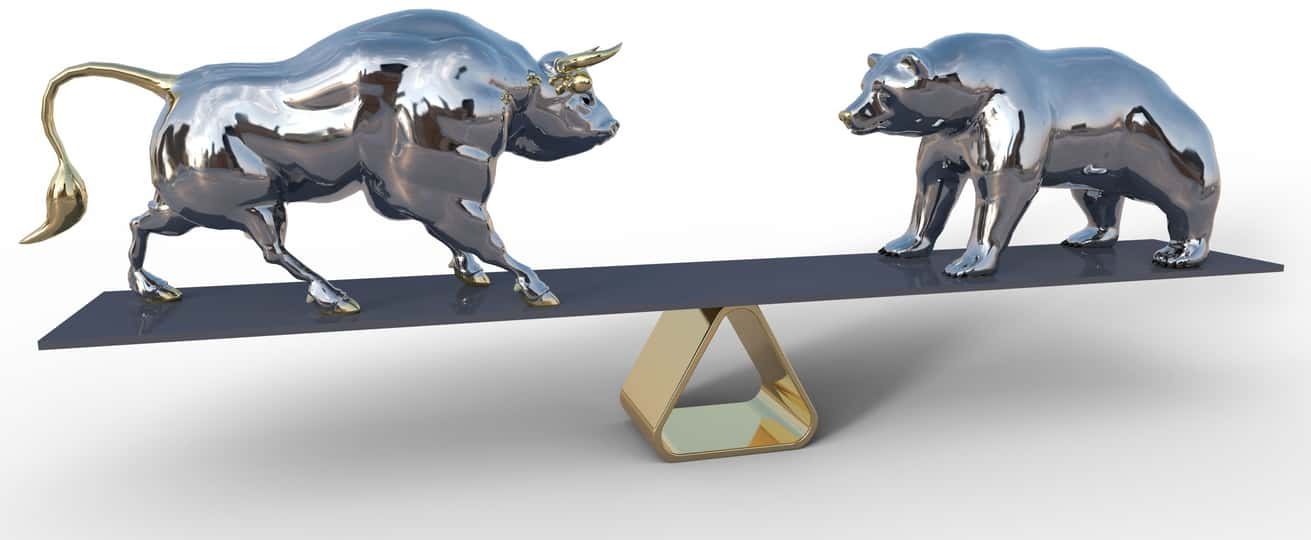The COVID-19 pandemic caused the biggest global economic crisis in a century. The broader market entered bear territory in March, falling to multi-year lows and erasing previous years’ gains. However, the market nonetheless rebounded very quickly to claim new highs. But after several months of bullish sentiment, investors are now exhibiting signs of caution regarding high stock valuation levels.
The stock market has had a solid start to 2021 despite the pandemic being far from over. Apart from the uncertainties related to the forthcoming change in Presidential Administration, the U.S. is facing a slower-than-anticipated pace of COVID-19 vaccination and the emergence of a new coronavirus strain. Goldman Sachs Chief Economist Jan Hatzius recently said “equities are likely to correct in the near term after fresh record highs were printed a few days ago, on the back of a fresh focus on the Federal Reserve potentially tapering its stimulus program.” Indeed, the quick uptick in long-term bond yields is sending a warning sign. Tech stocks have already witnessed a setback this week.
There are several ways to alter investment strategies in a declining market, but investing in inverse ETFs is one of the most popular and safer ways to protect a portfolio from declining in value. The structure of inverse ETFs helps them move against the market. These funds hold financial derivatives that bet on stocks’ price declines.
ProShares Short S&P500 (SH - Get Rating), ProShares Short QQQ (PSQ - Get Rating), ProShares Short Dow30 (DOG - Get Rating) and ProShares Short Russell2000 (RWM - Get Rating) are four such ETFs that may help you generate profits from a long-due market pullback.
ProShares Short S&P500 (SH - Get Rating)
SH provides inverse exposure to a float-adjusted market-cap-weighted index of 500 large- and midcap U.S. firms selected by the S&P Index Committee. SH offers a leveraged bet against the S&P 500 and aims to deliver inverse results over a single trading session, with exposure resetting monthly. In fact, SH is the most basic of market hedges.
SH has an MSCI ESG Fund Rating of A based on a score of 6.58 out of 10. The ETF currently has AUM of $1.84 billion and an expense ratio of 0.90%. It also pays an annual dividend of $0.03, which translates into a 0.16% yield.
SH is a complex ETF, consisting of swaps and other derivatives to bet against the underlying index. The index is exposed to various industries with information technology naturally leading the way, with an 28.2% weighting. The index also has an exposure of 14.2% and 11.6% to Healthcare and Consumer Discretionary sectors, respectively. The top three holdings of the index are Apple, Inc. (AAPL), Microsoft Corporation (MSFT) and Amazon.com (AMZN).
SH closed yesterday’s trading session at $17.67. The ETF has lost 25% in the past year but has witnessed a net inflow of $1.26 billion in the same period. SH is trading 46.8% below its 52-week high of $33.19.
ProShares Short QQQ (PSQ - Get Rating)
PSQ is a passively managed ETF that provides an inverse (-1x) exposure to the Nasdaq 100 Index, a modified market-cap-weighted index of 100 of the largest non-financial issues listed on the Nasdaq exchange. PSQ is designed to deliver inverse results over a single trading session, with exposure resetting monthly.
PSQ has an MSCI ESG Fund Rating of A based on a score of 6.58 out of 10. The fund’s expense ratio is 0.95% and it has an AUM of $515.8 million. The ETF also pays an annual dividend of $0.05, translating to a yield of 0.31%.
The ETF has entered a number of swap deals with major investment banking firms, backed by Treasury bills and cash holdings. The index is exposed to various industries, with a maximum 48% weighting to the information technology sector. The index also has an exposure of 20% and 19% to Consumer Services and Consumer Discretionary sectors, respectively. The top three holdings of the index are AAPL, MSFT and AMZN.
PSQ is currently trading at $14.27. The ETF is down 21.3% over the past six months but has witnessed a net inflow of $175.9 million in the same period. PSQ is currently trading 52% below its 52-week high of $29.70.
ProShares Short Dow30 (DOG - Get Rating)
DOG provides an inverse exposure to the price-weighted Dow Jones Industrial Average, which includes 30 of the largest U.S. companies listed on the NYSE, making it a potentially attractive option for investors looking to bet against this sector of the U.S. economy. This ETF is also designed to deliver inverse results over a single trading session, with exposure resetting daily.
DOG has an MSCI ESG Fund Rating of A based on a score of 6.58 out of 10. The ETF has more than $320 million in AUM and an expense ratio of 0.95%. Moreover, it pays a $0.05 dividend, translating into a yield of 0.14%.
The ETF is exposed to various swap instruments with major investment banking firms, backed by Treasury bills and cash holdings. The underlying index currently consists of 30 ‘blue-chip’ companies, with the information technology sector having a 23.5% weighting , followed by the healthcare and industrials sectors, with 18.9% and 15.1% weightings, respectively. The index’s top three holdings are UnitedHealth Group Inc. (UNH), Home Depot Inc. (HD) and Amgen Inc. (AMGN).
DOG is currently trading at $38.55. The ETF is down more than 20% in the past year but has witnessed a net inflow of $236.8 million in the same period. DOG is currently trading 46.4% below its 52-week low of $71.90.
ProShares Short Russell2000 (RWM - Get Rating)
The investment objective of the RWM is to achieve daily investment results that correspond to the inverse performance of the Russell 2000 Index. The ETF provides a one-day bet against the underlying index of 2,000 small-cap firms which attracts sufficient daily liquidity to make it a viable trading tool.
RWM has an MSCI ESG Fund Rating of A based on a score of 6.58 out of 10. The ETF has an AUM of $6.3 million and an expense ratio of 0.35%. RWM also pays an annual dividend of $0.05, translating to a yield of 0.21%.
The fund uses both ETFs and index swaps to achieve its inverse exposure. The index has a maximum sectoral weighting of 21.5% to the healthcare sector followed by 15.2% and 14.8% weightings in the industrials and financial sectors, respectively. The fund’s top three holdings of the fund are Penn National Gaming Inc. (PENN), Sunrun Inc. (RUN) and Caesars Entertainment (CZR).
RWM closed yesterday’s trade at $23.69, representing a 60% discount from its 52-week high of $59.19. The ETF is down 10% in the past month but has witnessed a net inflow of $16.6 million in the same period.
Want More Great Investing Ideas?
9 “MUST OWN” Growth Stocks for 2021
Is This ANOTHER Stock Market Bubble?
7 Best ETFs for the NEXT Bull Market
5 WINNING Stocks Chart Patterns
SH shares were trading at $17.65 per share on Thursday afternoon, down $0.02 (-0.11%). Year-to-date, SH has declined -1.78%, versus a 1.74% rise in the benchmark S&P 500 index during the same period.
About the Author: Sidharath Gupta

Sidharath’s passion for the markets and his love of words guided him to becoming a financial journalist. He began his career as an Equity Analyst, researching stocks and preparing in-depth research reports. Sidharath is currently pursuing the CFA program to deepen his knowledge of financial anlaysis and investment strategies. More...
More Resources for the Stocks in this Article
| Ticker | POWR Rating | Industry Rank | Rank in Industry |
| SH | Get Rating | Get Rating | Get Rating |
| PSQ | Get Rating | Get Rating | Get Rating |
| DOG | Get Rating | Get Rating | Get Rating |
| RWM | Get Rating | Get Rating | Get Rating |






